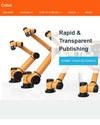Load torque observation and compensation for permanent magnet synchronous motor based on sliding mode observer
引用次数: 0
Abstract
Background Permanent magnet synchronous motors (PMSM) are widely used in various industries. However, in practical applications, the time-varying nature of load torque may lead to speed fluctuations, negatively impacting the motor's control performance and stability. To mitigate these issues, this paper proposes a load torque observation method for PMSMs based on a sliding mode observer. Methods The sliding mode observer is designed to estimate the load torque and convert it into a current, which is fed back as a feedforward compensation to the q-axis current in the current closed-loop control system. The observer's dynamic performance is optimized using a genetic algorithm to minimize the Integral of Time-weighted Absolute Error (ITAE) between the observer and the actual system state. Experimental tests are conducted on a motor torque testing platform. After stabilizing the motor at 800rpm, a sudden torque of 0.5Nm is applied. Results Compared to the situation without load torque compensation, the motor speed fluctuations are reduced by approximately 60% after adding load torque compensation. Conclusions This enhancement improves the system's speed control performance during torque variations and increases the system's robustness and disturbance rejection capability.基于滑动模式观测器的永磁同步电机负载转矩观测与补偿
背景永磁同步电机(PMSM)广泛应用于各行各业。然而,在实际应用中,负载转矩的时变性可能会导致速度波动,从而对电机的控制性能和稳定性产生负面影响。为了缓解这些问题,本文提出了一种基于滑模观测器的 PMSM 负载转矩观测方法。方法 设计滑动模态观测器的目的是估计负载转矩并将其转换为电流,然后作为前馈补偿反馈给当前闭环控制系统中的 q 轴电流。观测器的动态性能采用遗传算法进行优化,以最小化观测器与实际系统状态之间的时间加权绝对误差积分(ITAE)。实验测试在电机扭矩测试平台上进行。将电机稳定在 800rpm 后,突然施加 0.5Nm 的扭矩。结果 与没有负载转矩补偿的情况相比,增加负载转矩补偿后,电机速度波动减少了约 60%。结论 这一改进提高了系统在扭矩变化时的速度控制性能,并增强了系统的鲁棒性和干扰抑制能力。
本文章由计算机程序翻译,如有差异,请以英文原文为准。
求助全文
约1分钟内获得全文
求助全文
来源期刊

Cobot
collaborative robots-
自引率
0.00%
发文量
0
期刊介绍:
Cobot is a rapid multidisciplinary open access publishing platform for research focused on the interdisciplinary field of collaborative robots. The aim of Cobot is to enhance knowledge and share the results of the latest innovative technologies for the technicians, researchers and experts engaged in collaborative robot research. The platform will welcome submissions in all areas of scientific and technical research related to collaborative robots, and all articles will benefit from open peer review.
The scope of Cobot includes, but is not limited to:
● Intelligent robots
● Artificial intelligence
● Human-machine collaboration and integration
● Machine vision
● Intelligent sensing
● Smart materials
● Design, development and testing of collaborative robots
● Software for cobots
● Industrial applications of cobots
● Service applications of cobots
● Medical and health applications of cobots
● Educational applications of cobots
As well as research articles and case studies, Cobot accepts a variety of article types including method articles, study protocols, software tools, systematic reviews, data notes, brief reports, and opinion articles.
 求助内容:
求助内容: 应助结果提醒方式:
应助结果提醒方式:


